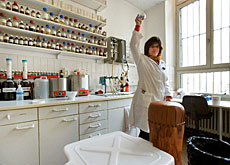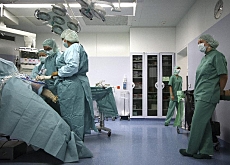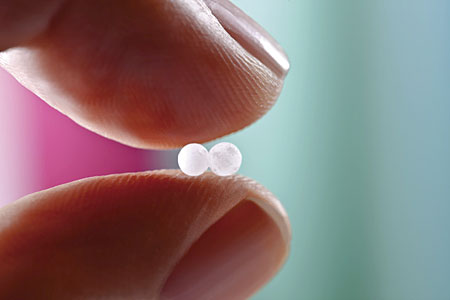Homeopathy gives rational voters a headache

Homeopathy and other alternative medicines are heading for the ballot box – but will the Swiss be voting for beneficial treatments or dangerous pseudoscience?
A Swiss scientist responsible for the largest study ever done on homeopathy explains why he will be following the government’s recent advice to keep alternative medicines off the basic health insurance.
Last year the interior ministry judged that five alternative therapies, covered provisionally by basic health insurance, failed to meet the criteria on efficacy, suitability and cost-effectiveness laid down in Switzerland’s health-insurance law.
This was challenged by supporters of homeopathy, one of the five rejected therapies, who soon collected enough signatures to force a referendum that should take place before 2009.
According to the Swiss Association of Homeopathic Physicians, which has roughly 400 members, “about 20 per cent of the population regularly use homeopathy, and according to some surveys up to 80 per cent have used it”.
Placebo
The science behind homeopathy (see box) is not difficult to refute, but the “problem” for scientists is that although homeopathy does not work in a clinical sense, it can induce physiological changes.
However, the largest study ever done on the subject, published in the Lancet medical journal last year by Matthias Egger of Bern University’s department of social and preventive medicine, concluded that homeopathy is no better than a placebo.
“We’re not saying that homeopathy doesn’t work,” Egger told swissinfo. “We’re just saying that the effects that people clearly experience are perhaps not due to the little white pills.”
The placebo effect – a change that results from an inert treatment because the patient believes it will work – is a well-studied phenomenon.
For example, confidently waving an ultrasound machine around someone’s face has been found to be effective for post-operative dental pain – regardless of whether the machine is switched on. Similarly green sugar pills are a more effective treatment for anxiety than red sugar pills.
“Some people are just open to [homeopathic] concepts,” Egger said. “They are happy to spend a lot of time chatting with someone who doesn’t spend just five minutes with them and writes them a prescription – they want some interaction. It’s basically a form of counselling.”

More
Health insurance
Ethics
One definite side effect of homeopathy is that it opens up a can of ethical worms.
Because placebos can make suggestible people feel better, there is an argument to be made for prescribing them. But many doctors are hesitant to do so for several reasons.
First, medical ethics demand that the relationship between the patient and the clinician should be based on honesty, respect and trust. Prescribing placebos would require the doctor to lie to the patient – otherwise the placebo would not work.
Second, prescribing placebos is a shortcut that tends to tackle the symptoms of the disease, rather than the disease itself. A headache could be a symptom of stress or a brain tumour, but the required treatments are very different.
The World Health Organization (WHO) warns that “unregulated or inappropriate use of traditional medicines and practices can have negative or dangerous effects”.

More
Referendum
Dangers
The main harm from alternative therapies, however, is not likely to come from the remedies, which are generally safe – although in Belgium at least 70 people required a renal transplant or dialysis after taking a herbal preparation made from the wrong species of plant as slimming treatment.
The real danger is not getting proper treatment by a conventional doctor when the patient could be helped by such treatment.
“I’ve witnessed a child with pneumonia who was treated with homeopathy for several weeks but who then needed an invasive procedure to drain pus from the lungs,” said Egger. “This definitely could have been prevented had the child received the appropriate treatment, in this case antibiotics, earlier on.”
Regarding the referendum, Egger gives a typically Swiss diplomatic and democratic answer.
“I respect these people, but the question is whether the social insurance system should pay if a majority doesn’t want to be treated with homeopathy,” he said.
“I’ll vote ‘no’, but I’m very happy to accept it if a majority of people really want these systems to be included.”
1999: the interior ministry rules that five therapies – homeopathy, herbal medicine, neural therapy, traditional Chinese medicine and anthroposophic medicine – should be covered provisionally by basic health insurance.
September 2004: Supporters of complementary medicine begin collecting signatures to force a vote to guarantee that all costs associated with these types of treatment are reimbursed under compulsory health insurance.
June 2005: the interior ministry says all five therapies fail to meet the criteria on efficacy, suitability and cost-effectiveness laid down in Switzerland’s health-insurance law.
September 2005: Supporters collect the necessary 100,000 votes.
August 2006: The cabinet recommends voting against the proposal. Parliament will now discuss the issue, which must be put to a nationwide vote before the end of 2009.
The Swiss health system cost SFr51.7 billion ($40.6 billion) in 2004.
This represents 11.5% of GDP.
Only the United States spends more: 15% of GDP.
Homeopathic treatment involves giving a patient small amounts of drugs that, in larger quantities, cause symptoms like those suffered by the patient.
It also involves a great deal of interaction between the practitioner and the patient.
Adherents assert that the therapeutic potency of a remedy can be increased by serial dilution of the drug (dynamisation) combined with vigorous shaking (succussion).
A common dilution of 30C means that one drop of active ingredient is diluted in 100 drops of water, then a drop of the resulting solution is dissolved in another 100 drops of water, and so on, until 30 dilutions have taken place.
They believe that this diluted water retains some “essential property” of one of the substances that it has contacted in the past.
Anyone who could repeatedly prove this in double-blind tests would win a Nobel Prize not only in medicine but also in physics.

In compliance with the JTI standards
More: SWI swissinfo.ch certified by the Journalism Trust Initiative





You can find an overview of ongoing debates with our journalists here. Please join us!
If you want to start a conversation about a topic raised in this article or want to report factual errors, email us at english@swissinfo.ch.